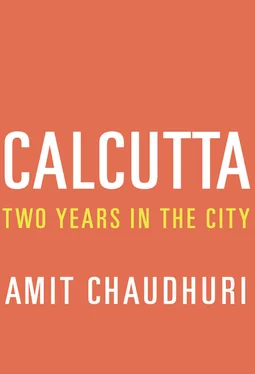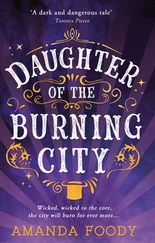Sen, during our meanderings through recent history, could have woven in his swan song, but didn’t. In fact, at the end of it we resolved to meet again — as if the more complex issues needed to be addressed later. “I’m sorry to ask you this,” I said, “but what do you think the outcome will be?” He’d been tolerant so far, and there was no sign that he’d be less so now. “You mean the elections?” he asked, regarding me steadily. “Yes.” “It’ll be tight,” he said. “Fifty-fifty.” “Really?” I was surprised: nothing about Sen suggested he was a bluffer or delusional, and all predictions — and the feeling in my gut — said the Left was headed for a crashing defeat. “What makes you say that?” “Well, two years ago it was different,” said Sen, referring to the Trinamool’s wipe-out of the Left in the general elections. “But now people have had a taste of their MPs and councillors, and know them for what they are. It won’t be the same this time around.” The trouble was, the electorate had tasted and drunk the Left for three decades; and, though Bengalis prefer an impressive degree of predictability in their diet, they seemed to have reached the limit of their love of the familiar. “What do you think?” he asked. “If you don’t mind my saying so, people are fed up with the Left Front,” I replied. A look of hurt flickered momentarily on his face. “They’d even prefer a nuclear disaster, and in the Trinamool Congress they may have found one.” We both laughed aloud at the joke. “One day, when we have more time, you must tell me why people are so fed up with the Left.” He was genuinely concerned and even tantalised. Over our two hours together, he’d conceded failures of foresight and governance. He’d also pointed out that not unless you were in government could you appreciate the exigencies of the scramble towards industrialisation: that neither globalisation nor the big corporations, like Tata, left you with a great deal of leeway for manoeuvre. But he asserted the Left’s successes, especially when I raised the question of its policies towards education: more and more children from remote villages were going on to finish school, and perform exceptionally in their higher studies. Why, then, were people fed up? “We probably need another conversation for that,” I said; and this prompted us to duly exchange cell-phone numbers.
I wasn’t certain, though, when I’d be seeing him again.
There had been two personal exchanges in our conversation, in the midst of our back and forth about the days of the Left Front in Bengal, bygone and present. The first was to do with my maternal cousin, Subho. When Sen’s constituency, Burdwan, came up at the beginning, I thought I should ask him if he knew Subho, who’d taught mathematics at Burdwan University, and now held a senior administrative office there; and, besides, was a long-time member of the Communist Party. Sen’s face softened into a smile and he said: “He sings beautifully”—my cousin is a singer of Tagore songs, East Bengali folk songs, and political songs. There was an echo, a concordance, in their lives too, that extended beyond the Party: just as my cousin has two children, an older daughter, and a younger son who’s mentally challenged, so too does Sen. The term he used, naturally and without self-consciousness, as if news of political correctness had still not arrived wherever he was, was “mentally retarded.”
The second, very brief exchange had to do with the allegorically named ministry of industrial reconstruction, conjured up in Jyoti Basu’s time, inherited by Sen: now particularly Kafkaesque (by which I mean not bizarre, but belonging to a parallel world that possesses its own veracity) since, to ordinary eyes at least, none of that “industrial reconstruction” had taken place. Yet it was this ministry, I told Sen, that had invited my father, soon after he moved to Calcutta in 1989, to become an advisor to Lily Biscuit. Advice from experts is much sought after in India, and readily proffered; as a result, the post of the advisor is among the easiest to create in a company. My father had reached the zenith of his career selling biscuits, becoming the first Indian chief executive of Britannia Industries in 1979. Britannia was an offshoot of the British conglomerate United Biscuits, under whose umbrella flourished Jacob’s, Huntley and Palmer’s, and Peek Freen’s, whose products had been integral to the English teatime. In consonance with the flight of capital from Calcutta in the sixties, Britannia had re-established its head office in Bombay in 1964. After almost twenty-five years, my father was back in Calcutta. That intervening history — of Britannia, my father’s job, and Calcutta — felt as compressed as a fable. In some quarters at least, my father’s reputation as biscuit guru must have preceded him (being an unusually modest man, he’d made no overtures himself) and reached Jyoti Basu’s ears (the chief minister had met him a couple of times). Lily Biscuit was a respectable indigenous phenomenon — Bengal-specific; a regional quality biscuit brand. Its lore originated aeons ago; my mother claims, correctly, that Britannia was absent from her youth, and unmissed, largely because the excellent Lily was then consumed with tea. Introduced into the world of the Bengali bhadralok by a Bengali bhadralok family, it finally ran out of steam, as bhadralok enterprise appears to. Will someone in the social sciences write a dissertation on how the rise of individualism in Bengal (in contrast to the West) destroyed rather than energised entrepreneurship, at least on home ground; how, in India, caste and community drive capital and the free market? Every morning in the early nineties, an Ambassador, a state government car, would pick up my father to take him to the Lily Biscuit offices in Ultadanga. By then, he was well into post-post-retirement, and I think he took this excursion — after having recently annexed the heights of the private sector in what was still largely a socialist economy — as a posthumous visit to a hidden underworld: the public sector, whose existence, all these years, he’d had nothing to do with. The daily journey was a journey into the dead. But he brought back tales of life: tea-drinking, laughter, and gossip in limbo. His reports were not unlike the accounts emerging now, in June 2011, of the sort of routines that governed the staff at Writers’ Building, the seat of government in Calcutta, in the last two decades. Lily Biscuit was a “sick” company, bought over by the West Bengal government to ensure there were no job losses — an ingenious form of anti — venture capitalism. Bengali industry was afloat with such vessels: proud barges and liners that were now, not run aground, but mildly stationary upon shallow water. Much the same thing had happened to the actual barges on the Hooghly, which had once made Calcutta a great port: they were sitting there for years.
I told Sen just a little bit about my father’s background: enough to hint we were in opposite camps in the class war. Sen looked unruffled. The old enmities have lost some of their edge in the bewildering world we inhabit. Besides, I only meant to register my own amusement that my relationship with the ministry of industrial reconstruction went further back than Sen’s.
My father had missed being one of the beneficiaries of globalisation. A student of English literature at Scottish Church College, Calcutta, then briefly a well-wisher of the Marxists while in London, then a nominal follower of M. N. Roy, the “radical humanist,” whose spell on him had never quite worn off, he found his calling at last on the narrow ledge of capitalism in socialist India. By the time India “opened up” and liberalised its economy in 1991, my father was acquainting himself with “industrial reconstruction” and the remnant of Lily Biscuit. He was not going to dip into the booty of the new economy; he draws a monthly pension of Rs 6000 from Britannia, less than what a retired government schoolteacher gets, because the new capitalists feel no philanthropic pang towards the private sector’s old guard.
Читать дальше












